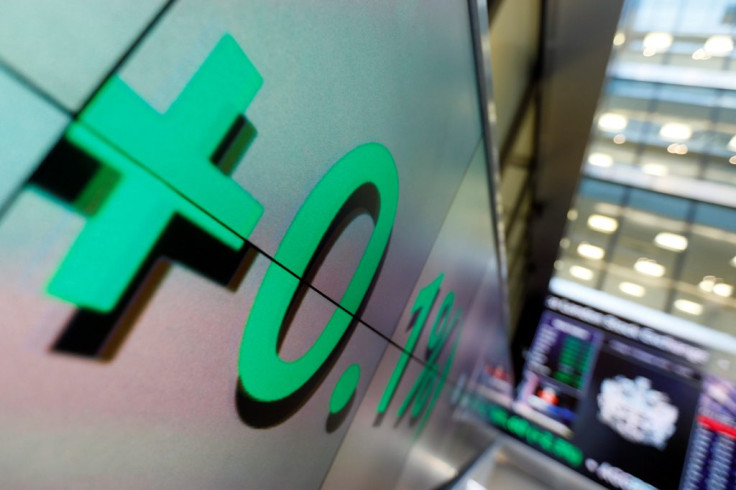European Markets Rise on Strong Eurozone PMI Data

European markets witnessed mixed trading at the open on 5 February, and turned positive thereafter, after data showed that output in the Eurozone expanded at its fastest pace since June 2011.
The Stoxx Europe 600 index opened 0.1% lower to 317.34.
Britain's FTSE 100 and France's CAC 40 opened 0.2% lower.
Germany's DAX 30 opened 0.3% higher.
Spain's IBEX 35 was trading 0.75% higher after opening flat.
Italy's FTSE MIB was trading 0.77% higher after opening flat.
Market participants await British pharma giant GlaxoSmithKline's fourth-quarter earnings update due at 12.00 GMT.
They will also be tracking US labour market data, due at 13:15 GMT. The ADP report would throw more light on the health of the world's leading economy and could provide hints about the US Federal Reserve's next move. Last week, the world's most powerful central bank announced it would further trim its bond buying stimulus by $10bn a month to $65bn.
Societe Generale Cross Asset Research said in a note to clients: "The weather is wreaking havoc on January data from the US, and indications from the Fed that it will not alter its tapering course despite the market volatility has caused a speed bump for risk assets and a rush into the shelter of core bonds and the JPY. The ADP employment and ISM services report may provide a crumb of comfort today but it will take a reassuring employment figure on Friday (and possibly a dovish ECB tomorrow) to paper over this year's early market cracks."
"Our economists expect a below-consensus ADP result for January (net additions of +140k) along with a downward revision to the November and December data (we look for a higher ISM). This could weigh on US yields but with the short covering having dragged yields below 2.60%, it would take another wild data miss for 10y yields to extend towards 2.50%. Fed speakers Plosser and Lockhart may add more colour on the economy and tapering outlook, but are unlikely to be singing of a different hymn sheet to Evans and Lacker."
In company news, RSA Insurance was trading 6.15% higher at 9:40 GMT in London. The British insurer has appointed former Royal Bank of Scotland (RBS) boss Stephen Hester as its new chief executive.
In other news, the euro zone's private sector logged its busiest month in two-and-a-half years in January, surveys showed on 5 February. Markit's Eurozone composite Purchasing Managers' Index (PMI) climbed to 52.9 in January from 52.1 in the preceding month.
Meanwhile, data from the UK showed that shop prices have fallen at the fastest pace in about seven years, as retailers offered deeper discounts to cope up with the difficult trading conditions.
The shop price index compiled by the British Retail Consortium (BRC) and Nielsen found accelerated shop-price deflation in January, falling 1.0% compared to 0.8% in December. This is the deepest level of deflation since the series began in December 2006, according to BRC.
January is the ninth consecutive month of deflation.
In Asia
Most Asian markets traded in green territory on 5 February, with the Japanese Nikkei leading the pack after logging its worst drop since June 2012 on 4 February.
India's BSE Sensex was trading 0.28% higher.
The benchmark Nikkei 225 finished 1.23% higher while South Korea's Kospi finished 0.24% higher.
However, Hong Kong's Hang Seng finished 0.60% lower while Australia's S&P/ASX finished 0.53% lower.
Financial markets in Shanghai remained closed for the Lunar New Year holidays.
"It seems the [Japanese] market is seeing a little bit of sell programs. The offers suddenly got heavy before the afternoon open," a Tokyo-based trader at a foreign bank told Reuters.
"The RBA dropping its easing bias is probably one the reasons [for the Australian market falling]," Chris Kimber, managing director at Sydney-based Kimber Capital told Reuters.
Capital Economics said in a note to clients: "As things stand, it is unlikely that weaker currencies will trigger a surge in inflation in the emerging world.
"But weaker currencies will aggravate inflation in countries where it was already a problem. Of the major emerging economies, this includes Indonesia, India, Turkey, Russia, Brazil and South Africa."
Capital Economics said in a separate note: "As global monetary conditions tighten, EMs that have either been serially mismanaged or have been living beyond their means are likely to suffer.
"Most of these are in parts of Latin America and Asia, but they also include Turkey and South Africa. These countries could face recessions at some point over the next couple of years."
On Wall Street
On Wall Street, indices finished higher on 4 February, following their largest selloff in months the day before, and were supported by some encouraging corporate earnings and steadier emerging market currencies.
The Dow Jones Industrial Average finished 72.44 points, or 0.5%, higher at 15,445.24.
The S&P 500 ended 13.31 points, or 0.8%, higher at 1,755.20.
The Nasdaq Composite finished 34.56 points, or 0.9%, higher at 4,031.52.
"Today is just a bounce. I don't think there is really that much behind it, other than some bargain hunters stepping in," Robert Pavlik, chief market strategist at Banyan Partners told CNBC.
Capital Economics said in a note to clients: "The sharp drop in January's ISM manufacturing index has led to some speculation that the US recovery might be coming off the rails, particularly as it followed an unexpectedly weak gain in payroll employment in December.
"We think these fears are overdone. After a very strong second half last year, there is no obvious reason why the recovery should suddenly collapse."
"Any impact of slower growth in China and other emerging markets should be more than offset by the improving outlook in Europe.
The broader picture is still that, with fiscal policy exerting a much smaller drag and the Fed committed to leaving its policy rate at near-zero for some time, US economic growth should remain solid," the firm added.
© Copyright IBTimes 2024. All rights reserved.






